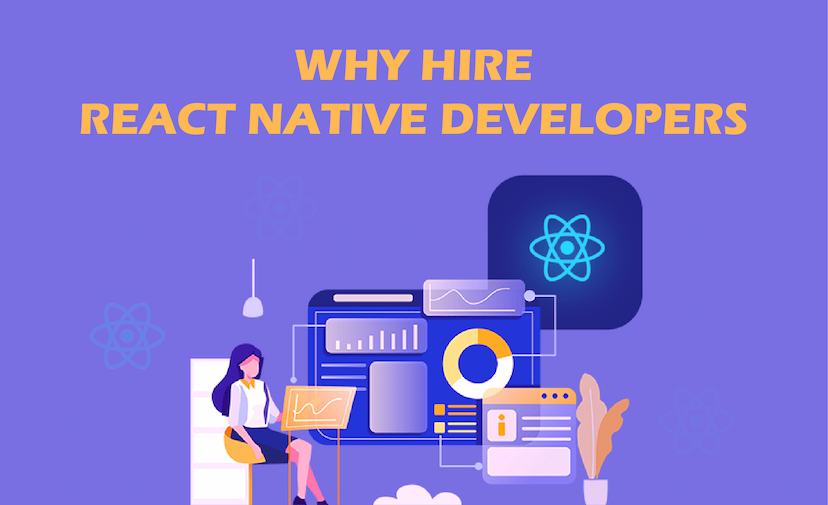
In the technology world of cross-platform app development, a limited number of libraries or frameworks deliver an actual Native-like experience that offers a quality solution. Among the selected few, 'React Native' stands out as a framework that flawlessly blends the best for businesses and end-users.
Throughout its development, React Native has positioned itself as the framework that comes immediately to achieving the desired trio for businesses. This places it ahead in rankings compared to the time-consuming Native App Development process because of its ability to balance quality and efficiency. Since React Native experienced a re-architecture, its momentum has only grown without any signs of slowing down.

The universal acceptance of React Native in the business landscape is apparent when reviewing the current market share of the framework. Multiple factors contribute to React Native's prominence in the ongoing discussion between React Native and Native App Development. However, a select few have substantially influenced our decision to broadly apply React Native in providing our cross-platform app development services.
Get in Touch Now!
Have a word with our expert consultants about your next project to get suggestive guidance & proposal.
Why Use React Native For App Development - Reasons
Here are the five reasons why, as the foremost React Native App Development Company, we rely on this framework for crafting mobile applications capable of seamless operation on both Android and iOS platforms:
Single Codebase
Different codebases are typically employed for Android and iOS in standard mobile app development. However, with React Native, the library facilitates the creation of applications that seamlessly operate on Android and iOS using the same codebase.
The singular codebase feature of React Native allows developers to write the code once and accomplish it across multiple platforms, eliminating the need for duplicative coding efforts. Eventually, opting for React Native in app development leads to enhanced development speed and reduced overall effort.
Reusable Component
The era of trusting WebView components for hybrid mobile app development has ended. This shift is assigned to the employment of reusable 'native components' by React Native app developers, allowing persistent compilation into native apps.
Further, the elements employed in Android and iOS app development find their equivalents in React Native. This comparability empowers developers to achieve platform-specific philosophy and functionality.
When designing React Native apps, the component-specific framework facilitates the accomplishment of platform-specific philosophy and allows for an agile, web-based development approach. This approach exceeds the traditional development process of typical hybrid apps, resulting in an application with the look, speed, and essential functionalities of a native mobile app.
Zero Rewriting
The library enables a React Native app development company to incorporate Native elements into the existing codebase of a mobile app. This removes the need for React Native app developers to start coding from scratch when transitioning the available mobile app to the React Native library.
Third-Party Plugin Compatibility
A considerable drawback of cross-platform app development emerges when creating a mobile app without targeting a specific operating system, such as native app development. In such cases, incorporating the device's hardware abilities into the mobile app becomes a challenging task.
However, this challenge is efficiently addressed in React Native-built apps. The library influences several third-party plugins, allowing developers to flawlessly integrate device-specific elements like GPS, Bluetooth, and more into the mobile app.
Furthermore, using third-party plugins by React Native app developers ensures that they do not encounter issues related to high memory usage and slow load speeds, providing a smoother development experience.
Improved Code Quality
Opting for React Native in app development represents a significant investment in low-code efforts. The mobile app development company considerably lowered its code lines by half due to the requirement to code only once for both platforms. This decrease minimizes the ability for bugs and faulty code and simplifies the testing efforts, resulting in an exceptionally faster mobile app development process.
The factors mentioned above, linked with the simplicity of development and the further benefit of clicking into a larger market size—something constrained in the case of Native app development—have fascinated various well-established brands to migrate their mobile business processes to React Native for App Development.
Brands Using React Native App Development
Multiple famous brands across various industries, which include Tesla, Bloomberg, Walmart, Facebook, Instagram, and Ubereats, leverage React Native App Development to deliver persistent and efficient mobile experiences. The framework's adaptability and productivity have made it a preferred choice for renowned companies aiming to enhance their mobile app presence.
Walmart
Striving to be the world's most ambitious and leading retailer, Walmart selects planned initiatives to acquire a competitive edge and promote customer experiences. A considerable move in this direction involved the transition of their mobile app from Node.js to React Native.
Since the switch, Walmart has observed improved app presentation on iOS and Android, fulfilling near-native practicality, smooth animations, and elevated performance with optimized resource utilization.
Tesla
Tesla, the leading company in the electric car industry, adopted the React Native community to expand the reach of its app globally. This application, which helps with vehicle diagnostics and partial control via smartphones, is efficiently live on both Android and iOS platforms, collecting positive feedback from users across both ecosystems.
Bloomberg
The recently launched mobile app for end-users targets providing clients with an appealing and seamless experience, presenting effortless access to personalized content, live feeds, and highlighted videos across Bloomberg Media. This app, accessible on both the Play Store and App Store, has been experiencing considerable user adoption.
UberEats
Ubereats has selected React Native App Development for its restaurant dashboard. Unlike the previous web version, which presented limited access to the device's native usefulness, this move addresses crucial user experience issues. Although React Native is just a small component of the overall app, UberEats developers convey confidence in its aptitude to meet the advanced needs of the growing market.
Skype
The decent messaging platform Skype has recently revealed its strategy to shift its Android app to React Native, introducing a complete revamp of elements such as layout and icons.
The revamped Skype not only presents enhanced performance and exceptional speed compared to its predecessor but also prides itself on expanded options, broadcasting a more equipped version than its older counterpart.
Even with the growing endorsement of React Native by conventional brands, it's essential to acknowledge situations where investing in React Native app development is wise and where It may not be. This section considers several scenarios where investing in React Native is justified and those where it may not be, shedding light on both prospects.
While a glimpse at the app categories where React Native is most commonly used provides insights into its common usage, other thoughts also play a role in determining the framework's suitability
When to opt for React Native in App Development
Employ React Native for app development when searching for cross-platform productivity, speed up development with a shared codebase, and balance native-like achievement and resilience. It shines in scenarios where time-to-market, cost-effectiveness, and an easy user experience across iOS and Android are critical.
When the App Belongs to Low to Medium Complexity
React Native app development confirms that it is most beneficial for low to medium-complexity apps. Further, it shines when leveraging reusable components, preventing the need to build everything from scratch.
When the Budget is Limited
For a time and cost-effective mobile app development, React Native appears to be an ideal library. Its application of a single codebase considerably lessens development efforts and time, accordingly minimizing the overall cost of React Native app development.
When Developing an App from Scratch
When establishing a cross-platform app from the ground up, opting for React Native is a smart choice. However, if you already have an existing app and are considering incorporating React Native code, we strongly advise against doing so.
When Not to Opt for React Native for App Development
Although React Native leaps out as one of the most popular and broadly used libraries for cross-platform app development on both Android and iOS, there are definite circumstances where its utilization is not appropriate due to inherent limitations. Here are some occasions when we discourage the use of the React Native library:
When the App would Be Better off with a Single Operating System
At times, businesses, in their pursuit of gathering global attention, invest in individual Android or iOS development or opt for a cross-platform solution like React Native without conducting thorough market research. It is suggested that businesses conduct a complete study of their user base, initially restricting themselves to one platform to evaluate acceptance. Instead of untimely developing apps for both platforms, prioritize Native app development on the platform where your target audience mainly exists.
When an App Has a Complex UI
While JavaScript promotes the creation of swift and responsive apps, the native building platforms for iOS and Android, such as Java, Kotlin, Swift, and Objective-C, prove more suitable for developing complex apps that depend greatly on device hardware. Further, if your app needs or will demand a higher level of customization, investing in Native apps would be a more logical choice.
When the App Calls for High Maintainability
React Native is observed to still be in its evolutionary stage. Therefore, when structuring an app demanding ongoing updates and maintenance, it is essential to review its support status in the React Native documentation. Besides, there is no decisive guarantee that Facebook will not discontinue React Native, making any certainty uncertain.
What Does the Future of React Native Hold
Given the library's numerous advantages, it is explicit that React Native is the right platform for your app. Uber, Walmart, and Facebook have made considerable investments in it, strengthening its stability and making it unlikely that Facebook will discontinue it.
Conclusion
Although React Native faces competition, especially from solid competition like Flutter, the rapid advancements within the React Native ecosystem make it a tremendous choice. Considering the current growth track, when Flutter or any other cross-platform framework reaches a comparable level, React Native's continuous advancements could render it unparalleled.










